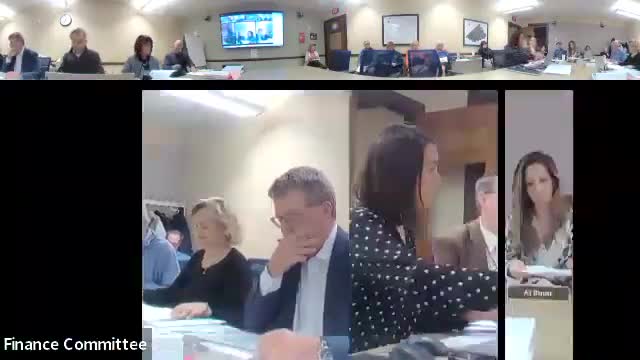Charles River Center project in Needham seeks town commitment as state bond money awaits application timeline
Get AI-powered insights, summaries, and transcripts
Subscribe
Summary
Charles River Center officials and project partners told the Town of Needham Finance Committee on April 14 that the state housing bond bill includes language authorizing not less than $5,000,000 for a pilot supportive‑housing program tied to the center’s planned housing, but committee members said they need precise statutory language and a timeline before committing town funds.
Charles River Center officials and project partners told the Town of Needham Finance Committee on April 14 that the state housing bond bill includes language authorizing not less than $5,000,000 for a pilot supportive-housing program tied to the center’s planned permanent independent housing for people with autism and intellectual disabilities.
The discussion focused on how that $5 million fits into a larger package of state soft subsidies and other financing, and on what the town must do — and when — to make the project eligible for a state pre‑application expected in November.
Why it matters: Committee members repeatedly pressed for the exact statutory or administrative language and for a calendar of deadlines because the town would be asked to commit local resources that come from limited Community Preservation Committee (CPC) reserves. Finance members said they need to know whether the town’s local commitment is a formal appropriation, the amount and timing, and whether free cash or CPC certification would affect availability.
Project partners described the state funding as part of a larger EOHLC (Executive Office of Housing and Livable Communities) package. Phil Freen, identified in the meeting as a project manager with the Planning Office for Urban Affairs, told the committee the $5,000,000 sits “within that $10,000,000 of state funding from the executive office of housing and local communities” and that one $5,000,000 piece is the pilot allocation discussed in the bond language.
Anne Marie Blanchard, introduced as president of the Charles River Center, and board member Cindy Chasten explained that the EOHLC pre‑application process typically begins with a November pre‑application and a full funding round in February. Bill Grogan, identified as the executive director of the Planning Office for Urban Affairs and a co‑development partner, said the EOHLC requires some form of local commitment for applications but “they don't specify it needs to be a certain dollar or a certain percentage.” He added that the local commitment generally must be demonstrated at pre‑application.
Financial details presented at the meeting show a development budget the presenters described as approximately $50,000,000 overall. Within that: about $31,200,000 is identified as construction cost, about $7,000,000 for soft costs, and roughly $6,800,000 for developer fee, overhead and reserves. The Charles River Center previously spent roughly $5,000,000 to acquire the project site, the presenters said. Predevelopment expenses of roughly $250,000 were described as already paid by the developer and expected to be reimbursed at construction closing.
Presenters described multiple funding sources being pursued in addition to the bond authorization: low‑income housing tax credit equity (investor proceeds), a sponsor deferred loan from Charles River Center (described as a $4,500,000 sponsor note that would be repaid only from available cash flow), Mass Save and Department of Energy Resources rebates tied to passive‑house energy features, and a planned capital campaign to raise funds for unit adaptations not covered by EOHLC. Anne Marie Blanchard said the capital campaign is expected to be a three‑year effort and that many unit adaptations (floor drains, wider doors, smart‑home technology, overnight monitoring and other individualized equipment) would be outside the state construction subsidy and must be covered by philanthropy or bridging finance.
On timing, Bill Grogan and other presenters said EOHLC typically opens a pre‑application round in November with a full application the following February; to participate the town would need a clear local commitment in hand by the November pre‑application. Several Finance Committee members asked whether a decision could be deferred to an October special town meeting or the regular fall town meeting without jeopardizing the state authorization. Presenters said they believed a fall appropriation could still work for a November pre‑application but that they would check statutory and administrative deadlines and return with written language.
Committee action: The Finance Committee did not take an appropriation vote on the warrant article at the April 14 meeting. Members requested that the Charles River Center and project partners send the relevant bond‑bill language and other clarifying documents by email before the committee’s next meeting; the proponents agreed. Committee members said they would revisit the article on the committee’s April 30 meeting and discussed the possibility of delaying a formal recommendation until October if needed to evaluate a loan structure or to allow additional time to confirm deadlines and free‑cash/CPC certification.
What remains unresolved: Committee members repeatedly asked three questions the presenters could not fully answer at the meeting — (1) the exact statutory or administrative deadline for obligating or accepting the $5,000,000 authorization; (2) the formal definition and amount of the “local commitment” EOHLC will require for the November pre‑application; and (3) an estimated total the Charles River Center intends to raise via its capital campaign for unit adaptations (presenters said the campaign planning is in an early, multi‑year phase).
The project’s proponents left the meeting with a request to deliver the bond‑bill language and a clearer schedule for EOHLC deadlines; the committee asked to see any formal EOHLC application materials before making a recommendation to town meeting.
